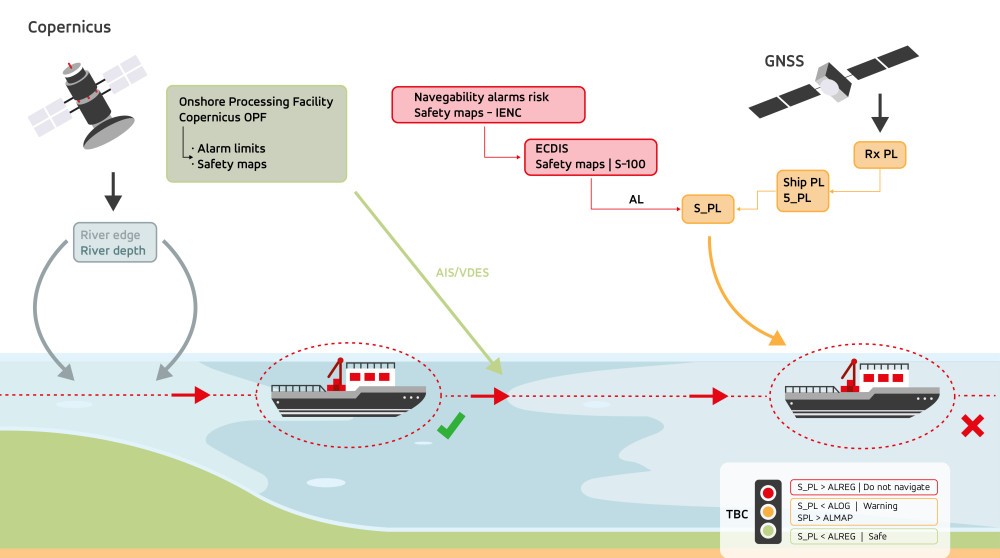
- Category: Members News | Tags: Automated vessels, Galileo, GNSS, Maritime, UAV
- 2025-05-15
At a time when technology is revolutionising every facet of transport, GMV is at the forefront of European innovation with a project aimed at introducing automated vessels in Europe’s inland waterways.
This ambitious initiative aims to harness the power of EU space data, marking a significant leap towards safer, more efficient and sustainable waterway navigation.
Founded in 1984, GMV is a Spanish private capital business group with an international presence and more than 3000 employees. The company’s areas of activities include aeronautics, automotive, cybersecurity, defence and security, space, finance, industry, healthcare, digital public services, and Intelligent Transportation Systems (ITS).
Autonomous vessel technologies are developing rapidly, but several challenges need to be addressed to ensure their effective and safe operation. The Automated Vessels on Inland waterways (AVIS) project, funded by the European Commission and led by GMV, includes eight partners from five European countries.
The AVIS project (37-month initiative launched in January 2024) focuses on addressing the challenges linked to the introduction of automated vessels in inland waterways:
- Improving reliability and robustness: autonomous vessels need to operate reliably in a wide range of environmental conditions. This requires the development of robust navigation systems, sensors and algorithms capable of handling the complexities of inland navigation.
- Meeting safety requirements: safety is of paramount importance for automated vessels. The project aims to provide high-precision positioning and heading information, particularly during critical manoeuvres such as lock-keeping, collision avoidance and bridge passage.
- Improving adaptability: vessels need to adapt to changing waterway conditions and traffic scenarios. Sophisticated algorithms capable of dynamic decision-making and real-time adjustments are crucial for this adaptability.
Key technologies used across the project consist in leveraging systems like GALILEO to provide precise positioning data, and COPERNICUS Earth Observation data for environmental monitoring, hazard detection and route optimisation.
The project focuses on developing onboard equipment prototypes, conducting pilot tests and contributing to the establishment of new regulations for safe navigation in collaboration with the European Committee for Drawing Up Standard in the Field of Inland Navigation (CESNI).
Benefits of the space-based solution
The AVIS project integrates precise satellite navigation data and Earth observation data into the operating systems of autonomous vessels. Such integration offers numerous benefits:
- Increased safety: high-precision positioning and real-time data significantly increase the safety of automated vessel operations, particularly in collision avoidance and navigation in difficult environments.
- Improved operational efficiency: automated vessels can optimise route planning and reduce human error, resulting in more efficient operations.
- Sustainability: improved navigation efficiency contributes reducing fuel consumption and minimises environmental impacts.
- Economic viability: improved safety and efficiency result in cost savings for operators, making inland navigation more competitive and economically viable.
Project timeline and future prospects
The GMV project is currently underway and is expected to be completed in early 2027. During this period, pilot demonstrations are being carried out in various EU inland waterways, with the aim to test and refine the prototype. These demonstrations will provide valuable insights to ensure that the technology is ready for widespread implementation.
Collaboration with CESNI is another key important aspect to develop new regulations ensuring safe navigation of autonomous vessels with the establishment of minimum requirements and operational guidelines for Autonomous vessel integration into existing waterway traffic.
Intended users
- Shipowners
- Port administrators
- Coastal and inland waterway administrators
- Other maritime stakeholders
To sum up
The AVIS project will provide accurate and reliable forecasts and enhance positioning for vessels to optimise inland routes and make them safer.
GMV’s work to support the introduction of automated vessels in Europe’s inland waterways represents an important step forward in maritime transport. By harnessing the power of EU space technologies, the project has the potential to redefine the future of inland waterway transport, setting new benchmarks for automation and safety in the industry.
The AVIS project aligns with the European Union’s broader goals of digital transformation and environmental sustainability.
To know more, visit the project website at: https://avisproject.gmv.com/
